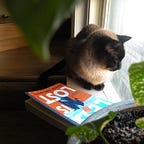Books I Can’t Stop Thinking About
1. The Memory Police | Yoko Ogawa | 1994
“People — and I’m no exception — seem capable of forgetting almost anything, much as if our island were unable to float in anything but an expanse of totally empty sea.”
On this island, people’s memories of certain objects are wiped overnight. Birds, roses, perfume… No one knows why — it’s just the way things are. When I say ‘no one knows why’, I include the reader, because Ogawa never explains what is going on. Is it a giant social experiment? A totalitarian government’s tactic?
I did not like this book when I read it. I felt a little disconcerted and quite confused about the meaning of the book. I wished Ogawa had explained the purpose of the disappearances and the ‘memory police’. But like a persistant itch, it niggled at my brain and occupied my thoughts for months to come. And that’s the mark of good writing, isn’t it? Even though (or maybe because) so much is left unexplained, the book is haunting and layered.
2. The Vegetarian | Han Kang | 2007
“Look, sister, I’m doing a handstand; leaves are growing out of my body, roots are sprouting out of my hands…they delve down into the earth. Endlessly, endlessly…yes, I spread my legs because I wanted flowers to bloom from my crotch”
On the cover of this Granta edition, there is a pull quote from the Guardian that reads “An extraordinary experience” and it is very fitting. This book is more of a surreal experience than a ‘read’. It begins with one woman’s decision to become a vegetarian (an increasingly commonplace decision, but her family are horrified) and it spirals into something quite disturbing. It’s a social commentary on our fear of non-conformity and the fragility of our psychologies.
3. The Castle | Franz Kafka | 1926
“If a man has his eyes bound, you can encourage him as much as you like to stare through the bandage, but he’ll never see anything.”
I could actually put all of Kafka’s stories on this list. Kafka’s writing is generally characterised by absurdity and despair, and protagonists walk in circles until they are forced to confront the truth. In The Castle, the protagonist K is a land surveyor sent to a small town that lies beneath a castle. He exists in a state of perpetual confusion — he does not understand the villagers’ bizarre treatment of him, their culture, the nature of his role there, or even who sent him to the town in the first place.
The Castle is a memorable book for two reasons. First, the slow, seemingly endless, and altogether confusing peeling back of layers to reveal the truth. The circular logic of all the characters reveals something really laughable about human nature. Second, the book ends mid-sentence. Just as you believe you are about to uncover the truth about this weird town, it’s over. Man, does the unfinished mystery get to you.
4. A Little Life | Hanya Yanagihara | 2015
“You have never known fear until you have a child, and maybe that is what tricks us into thinking that it is more magnificent, because the fear itself is more magnificent. Every day, your first thought is not “I love him” but “How is he?””
I am sure that this book is on many readers’ ‘Books I Can’t Stop Thinking About’ lists, and this is for good reason. Utterly grim but very beautiful, A Little Life follows the lives of four young men in New York. Trauma is piled onto the shoulderes of the main protagonist, Jude, who is a strong but most piteous character. What made this book memorable for me though, is the voice of Harold, Jude’s mentor and father figure. Offering a wise and optimistic perspective to a novel full of doom and gloom, it is Harold’s story that really sticks.
5. Cloud Cuckoo Land | Anthony Doerr | 2021
“Because if it’s told well enough, for as long as the story lasts, you get to slip the trap”.
This one is an epic love story to books and and the power of storytelling. Part of being human is the sharing of stories, Doerr says, and this gift means we can imagine ourselves out of truly horrifying situations. The lives of its characters across time and space are connected through a fictitious epic written by Diogenes, Cloud Cuckoo Land.
This is one of the most ambitious novels I have read but amazingly executed. It follows Anna and Omeir through the fall of Constantinople in 1453, Zeno through the Korean War and later through a bomb threat in a library, Seymour through the current climate emergency that society has shut its eyes against, and Konstance through an unknown contagion in a sealed spaceship. Even though these many elements should make the book very confusing, Doerr expertly weaves the stories (as well as the actual story of Diogenes’ Cloud Cuckoo Land) together. The result is really sublime.
